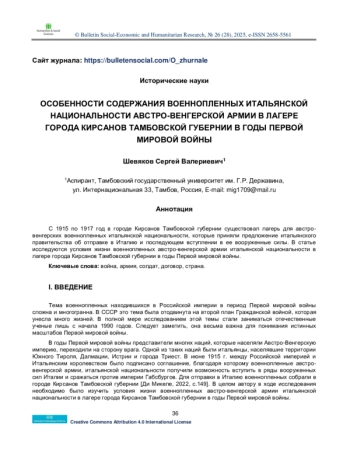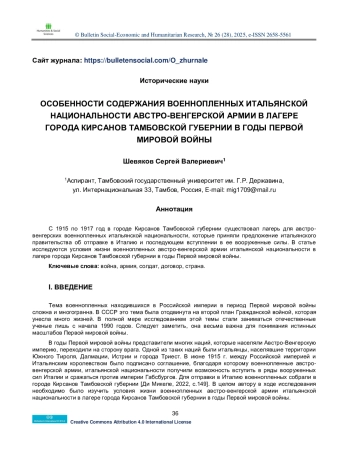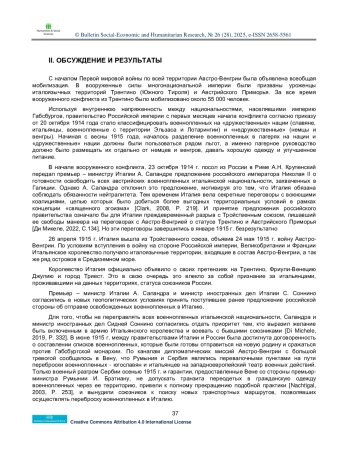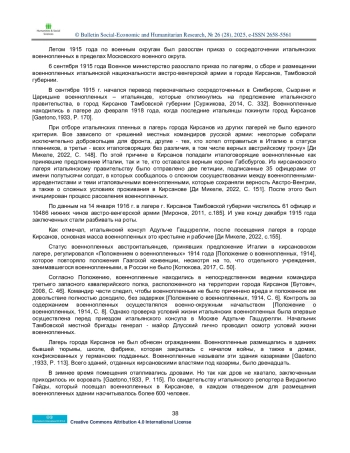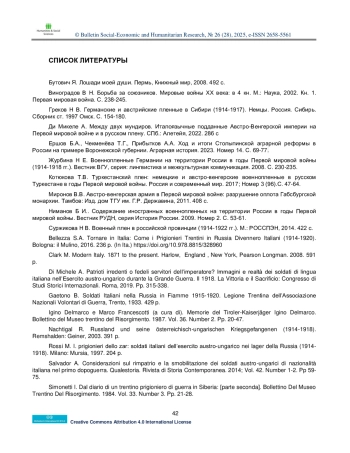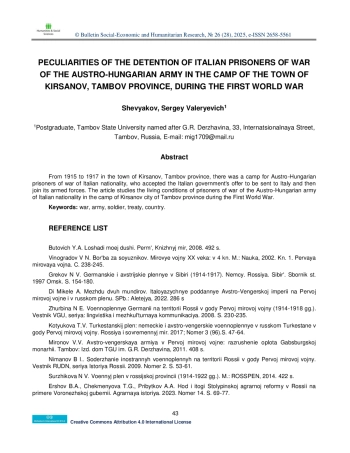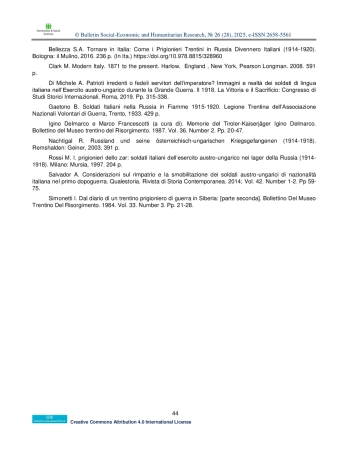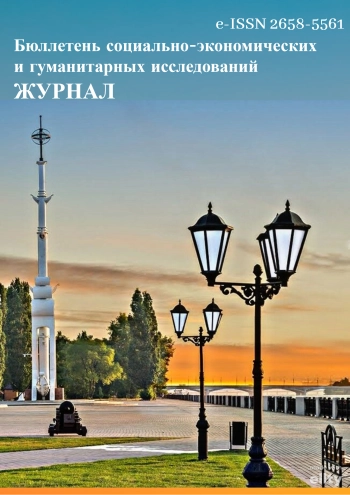From 1915 to 1917 in the town of Kirsanov, Tambov province, there was a camp for Austro-Hungarian prisoners of war of Italian nationality, who accepted the Italian government’s offer to be sent to Italy and then join its armed forces. The article studies the living conditions of prisoners of war of the Austro-Hungarian army of Italian nationality in the camp of Kirsanov city of Tambov province during the First World War.
С 1915 по 1917 год в городе Кирсанов Тамбовской губернии существовал лагерь для австро-венгерских военнопленных итальянской национальности, которые приняли предложение итальянского правительства об отправке в Италию и последующем вступлении в ее вооруженные силы. В статье исследуются условия жизни военнопленных австро-венгерской армии итальянской национальности в лагере города Кирсанов Тамбовской губернии в годы Первой мировой войны.
Идентификаторы и классификаторы
Выпуск
Другие статьи выпуска
The article examines the historical context and main provisions of the Cultural Agreement between India and Japan, concluded in 1957. The study attempts to consider the agreement as an independent historical source, an example of Eastern methods of “soft power” used to strengthen the position of one’s country. The author concludes that the agreement was necessary to strengthen foreign policy ties in the region, it provided benefits to each of the parties, and laid the foundation for further cooperation.
The article aims to reveal the understanding of war in Russian religious philosophical thought by Solovyov V., Dostoevsky F., Tolstoy L., Ern V., and others. It shows the contrasting views of Russian thinkers on war and its significance for the individual and society. War is a complex moral problem in Russian philosophy, and its very emergence coincided with a period of armed confrontation with Western European powers. Experiencing wars, Russian thinkers reflected on the historical destiny of Russia, on the moral preaching of the necessity of armed defense of the Motherland, on the Christian meaning of war, and on its dialectical contradictions.
This article is about how Euroscepticism has developed in modern Hungary. After the communist regime fell in Hungary, one of the new government’s top foreign policy priorities was to “reunite” Hungary with the rest of Europe. European integration was associated with modernization, the spread of Western values, and the establishment of a high standard of living in the country with European salaries and a stable economy. There was a unique consensus among the Hungarian political elite on the need for the country to join the European Union. However, after Hungary joined the European Union in 2004, the proportion of Hungarian citizens with a negative attitude towards the EU increased sharply. The reasons for the emergence of Euroscepticism in Hungary can be divided into pragmatic and ideological ones. After joining the EU, when economic expectations were not met, the disappointment of Hungarian citizens increased significantly. The 2008 economic crisis, which hit the Hungarian economy hard, also played a key role in the development of Euroscepticism. The EU’s ineffective crisis management provided fertile ground for the growth in popularity of Eurosceptics. Hungarian Eurosceptics oppose the EU because they are convinced that it threatens the country’s independence and pushes it towards “colonial” status.
The article deals with the specificity of Russia’s cultural and historical patrimony, which begins with a deep study of its Orthodox tradition. When we talk about the Orthodox culture of Russia, we mean not only the past, but also its modern state. The culture of modern Russia includes not only museum exhibits, vast book collections, and impressive architectural structures. Modern Russian culture is reflected in the language, observance of traditions, education system, respect for the older generation, priority of family values, patriotism and respect for other cultures and peoples.
The concept of “psychological tourism” is only beginning to gain popularity, mainly as a practical direction offered by travel agencies, individual psychological centers and event-organizations. Different interpretations of this concept, as a rule, are limited to the description of the content, without touching upon theoretical aspects and without providing a conceptual basis for this practice. The concept of “psychological tourism”, despite its apparent clarity, allows different interpretations: from a specific type of tourist activity to the field of psychological practice or their symbiosis. However, the characteristic features and specificity of PT, its methodological apparatus, mechanisms of therapeutic influence and its position in the system of psychological assistance require further elaboration. Within the framework of this article we intend to propose a working definition of “psychological tourism” as an applied tool of group psychological support, as well as to form a theoretical framework based on the integrative approach in psychology.
The conclusion of the Union Treaty on the formation of the USSR on December 30, 1922 at the first All-Union Congress of Soviets, which legally established the Soviet Union, was an important milestone that left a deep mark in world history. This act greatly influenced the formation of a strong and sovereign state that defended the interests of the working class and was widely recognized on the world stage. Regardless of individual perceptions of its significance, the enormous impact of the USSR on the course of historical events and the future cannot be ignored, otherwise it would be a clear distortion of reality. In this article we will examine in a concise and understandable form the factors and conditions that led to the formation of this state.
Drawing on students’ views, this article examines the impact of educational strategies and techniques used in distance learning on the development of various motivations for learning, including the desire for interaction, professional growth, exploring new areas, achieving success, connecting with others, creative fulfillment, and avoiding failure.
At a time of rapid technological development, the field of education is also undergoing significant transformation. The introduction of digital tools is revolutionizing traditional teaching methods, opening up new opportunities for teachers and students. In this article, we will analyze how digital innovations are transforming the educational model and what benefits they provide.
Статистика статьи
Статистика просмотров за 2025 год.
Издательство
- Издательство
- МИРОВАЯ ИСТОРИЯ
- Регион
- Россия, Воронеж
- Почтовый адрес
- 394068, Воронежская обл, г Воронеж, пер Мечникова, д 22
- Юр. адрес
- 394068, Воронежская обл, г Воронеж, пер Мечникова, д 22
- ФИО
- Ершов Богдан Анатольевич (ДИРЕКТОР)
- Контактный телефон
- +7 (___) _______
